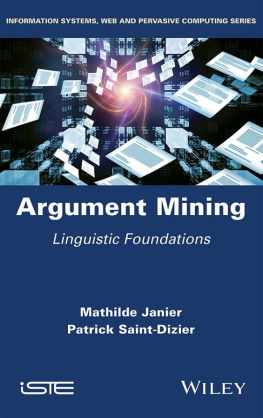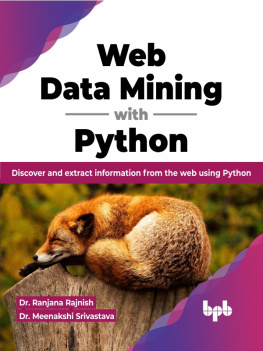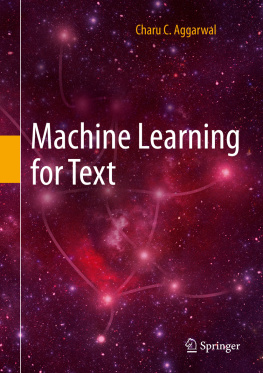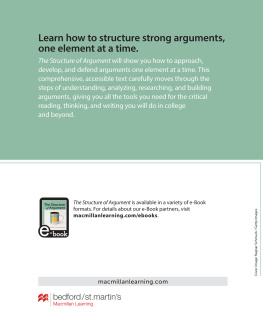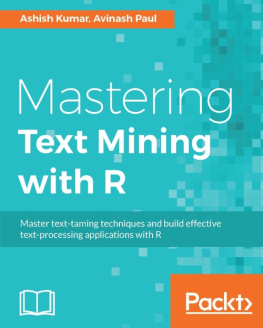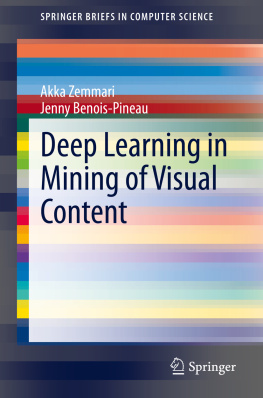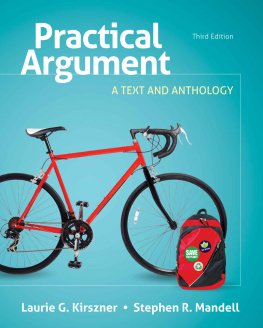
Argument Mining
Linguistic Foundations
Mathilde Janier
Patrick Saint-Dizier

First published 2019 in Great Britain and the United States by ISTE Ltd and John Wiley & Sons, Inc.
Apart from any fair dealing for the purposes of research or private study, or criticism or review, as permitted under the Copyright, Designs and Patents Act 1988, this publication may only be reproduced, stored or transmitted, in any form or by any means, with the prior permission in writing of the publishers, or in the case of reprographic reproduction in accordance with the terms and licenses issued by the CLA. Enquiries concerning reproduction outside these terms should be sent to the publishers at the undermentioned address:
ISTE Ltd
27-37 St Georges Road
London SW19 4EU
UK
www.iste.co.uk
John Wiley & Sons, Inc.
111 River Street
Hoboken, NJ 07030
USA
www.wiley.com
ISTE Ltd 2019
The rights of Mathilde Janier and Patrick Saint-Dizier to be identified as the authors of this work have been asserted by them in accordance with the Copyright, Designs and Patents Act 1988.
Library of Congress Control Number: 2019943909
British Library Cataloguing-in-Publication Data
A CIP record for this book is available from the British Library
ISBN 978-1-78630-303-5
Preface
This book is an introduction to the theoretical and linguistic concepts of argumentation and their application to argumentation mining. It partly emerged from a course given at the ESSLLI summer school held in Toulouse in July 2017. Argumentation mining is now an important research and development activity. It can be viewed as a highly complex form of information retrieval. Argument mining addresses compelling application needs like those posed by complex information seeking like reasoning for or against a controversial statement, e-debate or getting to know the different aspects of a complex issue.
Argument mining has its roots in information retrieval and question answering, with a higher theoretical and practical complexity. In particular, arguments are complex natural language constructs, with several relational aspects and implicit elements, such as the premiseconclusionwarrant triad. Therefore, it is not surprising that argument mining requires high-level natural language processing technology. Argument mining requires either complex machine learning algorithms or lexical and grammatical systems, which can deal with the complexity of arguments considered in isolation and in a context with other arguments. The goal of this book is to introduce the reader to the main linguistic and language processing concepts.
Understanding how argumentation is realized conceptually and in language usually implies manually annotating argumentation components in various types of corpora. Annotations may then be used to develop linguistic data or to train learning algorithms. Annotation is in itself a challenge, because it addresses complex phenomena, which require much training to be accurately analyzed. The complexity of annotation tasks frequently entails relatively high disagreement levels among annotators and therefore the need to develop precise guidelines and methods to reach consensus.
Argument mining requires an accurate taking into account of a number of complex models and techniques from the theory of argumentation, linguistics, corpus analysis, natural language processing technology, machine learning, knowledge representation and reasoning. The software engineering aspects may also be complex, for example, to organize the different steps of a real-world system and to update it, including the management of language resources and the production of an adequate synthesis of the arguments and other textual elements that have been collected.
This book is conceived as an introductory book that can be used as a text book for undergraduate and graduate courses in linguistics, artificial intelligence or natural language processing. It may also be useful for practitioners aiming to undertake an argument mining project. It requires some basic background in linguistics, language and computer science. Most if not all the concepts of argumentation that are crucial for argument mining are carefully introduced and illustrated in a simple manner in this book. Programming samples are given in simple and readable logic programming forms. These samples can then be transposed to a large variety of other programming paradigms. Finally, a set of well-chosen references allow the reader to go beyond in different directions, either technical or conceptual. This book is therefore conceived to be accessible to a large audience of students and practitioners.
In this book, we show that linguistic analysis and natural language processing methods can efficiently and accurately be used to mine arguments. This book aims at presenting well-founded and concrete approaches, genre and domain-independent or delimited to a given domain, which can be deployed in applications. Evaluation methods provide means to measure the overall quality of a system or a resource used to train a system. This book also describes different approaches to annotate arguments in argumentative texts and debates either written or transcribed from oral exchanges. It discusses strengths and weaknesses of such approaches and provides criteria to choose an approach given application goals. Corpus annotation is frequently viewed as the basis that shapes a running system. This tasks is presented in detail in this book, after the presentation of the main conceptual and linguistic concepts of argumentation.
This book is organized into two parts. The first part, from shows that argumentation is a complex process where the textual aspects presented in the previous chapters must be paired with a number of non-verbal elements such as sounds or images to allow for a real understanding of an argumentation process.
Each chapter is conceived to have a certain independence and the reader may skip those that are of less interest to him. For example, the reader can concentrate on the annotation chapter or on implementation issues, leaving aside the more theoretical considerations of the first chapters.
The reader must be aware that argument mining is still in a very early development stage. Developing a full-fledged system is still a mid- or a long-term research, which requires a lot of efforts from different disciplines. The elements presented here are those that have been stabilized and evaluated. This book contains a few elements that show the challenges still to be resolved to develop real argument mining systems and to make the results of such a mining process accessible to users.
We feel this book contributes to clarify and possibly to open new investigation and analysis directions in information retrieval in general, at the intersection of language, cognition and artificial intelligence. Argument mining covers many useful applications for our everyday life as well as more intellectual aspects of natural argumentation.
To conclude this preface, we would like to thank the French CNRS (Centre National de la Recherche Scientifique) for providing us with the adequate means and environment for fulfilling this work. We also thank very much Dr. Marie Garnier for an in-depth proofreading of the first part of this book and her questions, which helped improve the quality of the text. We would also like to thank to a number of close colleagues with whom we had joint projects or fruitful discussions. We thank, in particular, Drs. Katarzyna Budzynska, Chris Reed and Manfred Stede.
Next page
